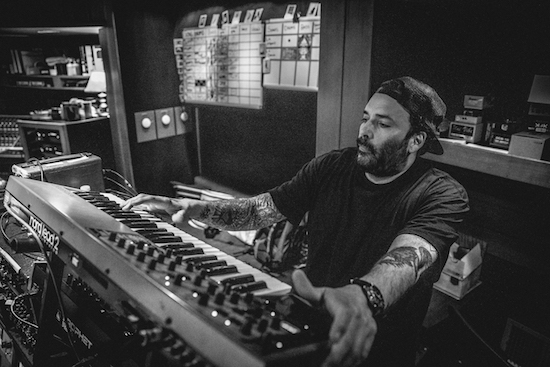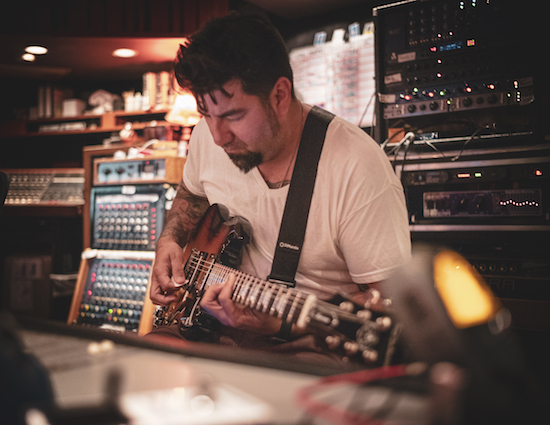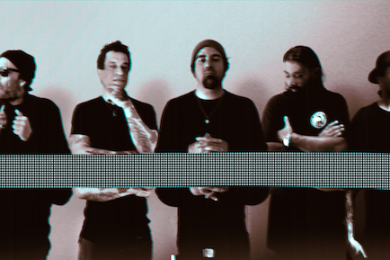Deftones portrait by Tamar Levine
I can remember when I first saw the name “Deftones” passing briefly through my field of vision in the pages of Melody Maker in 1995. I approvingly internalised it, mistakenly, as being a contraction of ‘deft’ and ‘ones’, before moving on. This was still before the time you could immediately click on a link and satisfy your sonic curiosity, so on some lower, less conscious, level I figured that this was some quicksilver band who considered themselves precise in their movements and decisions, proud to display intelligence, skill and agility. And then the fact that they referred to themselves so haughtily in the third person was merely the very fine self-mythologising cherry on a fabulously self-assured cherry Bakewell cake; a sentiment called to mind, no doubt, by Suede’s recent single ‘The Wild Ones’.
Of course I was wrong. Their name takes the originally African American slang ‘def’ – which came to be closely associated with hip hop in the late 80s – meaning outstanding, and combines this with ‘tones’. This was a common suffix added to band names in the 1950s among those playing surf or doo wop. It’s a play on the phrase tone deaf but there is still something misleading about the name. When the band were preparing to release their breakthrough album White Pony in 2000 they wanted to get the entire record remixed by DJ Shadow who was incredulous. He hadn’t heard any of their music and (perhaps subconsciously thinking of the Mighty Mighty Bosstones) mistakenly believed a ska band were trying to employ his services.
It’s many years, decades in fact, since I realised my mistake but their name always makes me chuckle a little. The ‘Def’ bit has weathered the years well. Not only is Def Jam an American institution synonymous with the foundational years of rap but there have been staging posts along the way like El-P’s Def Jux label (now Definitive Jux). However, the ‘tones’ bit is a curio for sure.
The name of a band like Dick Dale And The Del-Tones can’t help but make me think of surfers, while Deftones’ music makes me think of the sea itself – an implacable oceanic body, moved by and creating unimaginable forces, a dual vision of awful ugly fury and sublime beauty. A band like The Quin-Tones, with their now almost unimaginably vintage sounding honeyed doo wop, present a very manicured, adolescent, binary representation of human emotion – they offer simply either longing and love, or love and loss, and little between these fixed points. Deftones make a sonic representation of the weft and warp of emotional fibres that combine to make the unique tapestry of what we are. They produce songs which, at their best, are proxy to raw human emotion, in all of the unexpected, conflicting complexity that this suggests – the kind of emotion that very rarely gets adequate representation anywhere, let alone in the febrile world of heavy metal.
Formed in Sacramento, California in the late 80s, they eventually became an exquisitely balanced thing by the release of their second album Around The Fur in 1997. Today, singer Chino Moreno, more than anyone is responsible for the relatively complex emotional bent of this music, but he finds his necessary counterweight in the thunderous riff-smithery of Stephen Carpenter; and in the expansive soundscapes wrought by electronics expert Frank Delgado, while the tornado is anchored to the ground by the pointilist rhythm section of Abe Cunningham (drums) and Sergio Vega (bass).
It’s two decades on from White Pony and they have just released an excellent album in the shape of Ohms. It’s undeniably tougher than the more electronically-led Gore (2016), suggesting a closer engagement of guitarist Carpenter with the project, but otherwise it’s everything you would both expect and wish for from a new Deftones album in 2020.
While Deftones were never really a nu-metal band to begin with – I think we can classify 2000’s pseudo-rap/rock single ‘Back To School (Mini Maggit)’ as the exception rather than the rule – it’s gratifying to see how they’re the only band from that scene who has not just survived but flourished in artistic terms as well. But then they always had open ears and always clearly felt comfortable expressing their love for The Cure, UNKLE, Radiohead and WARP records, as much as they did for Celtic Frost, Sepultura, Metallica and Soundgarden.
How very singular. How very deft.
How has your lockdown been Chino?
Chino Moreno: It’s been pretty mellow. Like everyone else I’ve been laying low, hanging back and waiting for things to blow over [laughs]. For most of the time I’ve been preoccupied with Ohms, so I’ve been able to really take my time with formalising the mixes, looking into the art and all of the other stuff that comes long with putting out a record. I’ve been engulfed with that so I guess that has helped.
You write in a unique, purposefully ambiguous style when it comes to lyrics, creating an emotional framework for the listener to hang their own specific experiences onto but I was wondering if any of the songs have a different, more specific, feel or colour to them now (because you wrote all of them before the pandemic hit).
CM: I finished the last of the lyrics and finished everything right at the end of last year. So it’s kind of weird that a lot of Ohms already had this sort of dystopian feel to it. And in retrospect now reading through a lot of the words there are a lot of references to isolation and lyrics that are very attached to these days. This is an ironic thing because it was all written pre-shut down. It’s definitely a trip in that it seems to really hold itself up to today given that six months ago we lived in a whole different world.

Stephen Carpenter
When you start writing a new album like Ohms do you consciously feel you have to differentiate more from the last album, to push things on or does it happen organically?
CM: A little of both. Obviously the idea is to always expand upon what we did before but not follow any formulas that we fell upon while recording previous albums but at the same time without trying to totally reinvent ourselves. We are going to do what we do because we’re the five individuals that make records together. We do like it to be an organic experience where we don’t really sit down and have a prefixed idea of what we’re going to make. We really just go in and everyone starts making noise and then we all individually start reacting to that noise and it’s kind of like a chain reaction. And the next thing you know a song rears its head from that noise. That’s usually my favourite moments from the music we make is when it’s organic like that.
This album is a lot heavier and a lot more guitar-focused than Gore, and I was wondering is there to be something to be said about the dynamic relationship you have with Stephen here. When the album becomes more guitar focused is that to do with your relationship?
CM: I don’t feel that it’s that black and white. I do feel that on the last record especially Stephen’s presence wasn’t as heavily felt and that really had nothing to do with any of us wanting to go in another direction. The best songs we make are when everybody is firing on all pistons. He was just a little bit removed that time you know? I mean physically he was there in the studio every day but in his mind… whatever he was going through at the time he wasn’t as mentally as engaged and present in some of the song writing. When we work on a record we’re working under a time frame and at the 11th hour he joined in [more] and started playing over some of the ideas we’d had but it was almost too late. We needed to put the record out and I think it may have suffered a little bit because of that. But we took it as a learning experience. That was one of the main things was to get him engaged, and get everyone engaged! Because that’s when we’re going to make our best music. That’s when everyone is engaged. When they’re obviously enjoying what they’re doing and that’s what we did with this one.
Long term fans of the band are going to be very interested to see that Terry Date is back in the fold for production duties on Ohms. But why now?
CM: Well, I think it was something we had wanted to do for a while. We had a great time working with Nick Rasclulinecz who did Koi No Yokan and Diamond Eyes. But you know we didn’t not work with Terry because we didn’t want to, it was just that circumstances were against us. We always had it in mind that we’d love to work with him again. Sonically he’s a great engineer and as a close friend of ours I feel like there’s no learning curve when we show up to work with him. We can turn up and everyone can really be themselves without any distraction. He knows us all inside and out. He’s very patient and that’s important. We really wanted to take our time with this album and not feel like we just had to put out a record for the sake of it. We wanted to make something we all collectively felt affectionate for.

Frank Delgado
I get the impression that Terry is metal to the core. It made me laugh when I read that story that he wouldn’t have anything to do with you when you were trying to record a cover of The Smiths…
CM: [laughing] Yeah, that was really funny. This was when we were doing our first album Adrenaline in 1994. We were in the studio trying to record a cover of ‘Please, Please, Please, Let Me Get What I Want’. It was out of character for the record, so to him it just did not make sense. And in retrospect it probably wouldn’t have made sense for it to be on the record. But we were pursuing it for fun and I remember about halfway through recording it… [laughs] in his defence we were probably doing a terrible job of it. [laughs] And he just stood up half way through the recording and he said, ‘You guys, this is not working out. I don’t really want anything to do with this.’ So you know we laugh about it now, we ended up doing it by ourselves. [This version can be heard on the 2005 compilation B-Sides And Rarities.]
Terry is very open minded. I think some of his first records were more metal, for sure, he produced Metal Church a few times but he also did Swass by Sir Mix-A-Lot in 1988. [The debut LP from the butt-fixated Seattle rap superstar actually features Metal Church, on the Sabbath-sampling track ‘Iron Man’.] Terry really lets you figure shit out for yourself. He’s not sitting there dictating where the music should go. He has the patience to let you follow your instinct as to where the music should go and then is there to capture it.
I guess it’s an example of just how much metal bands were expected to stay in their lanes in the mid-90s. To what extent do you feel that it’s not a battle that anyone has to fight any more. Like any metal band can now say I like The Smiths, I like Sir Mix-A-Lot, I like The Cure, I like DJ Shadow or whatever. Do you think the landscape has changed as much as you’d want it to?
CM: Yeah I think so. But even back then I didn’t really feel the pressures of that anyway. I never felt like we had to stay within these boundaries when we were making music. And probably the biggest example of that would be when we made the White Pony record. At that time the radiowaves were ruled very much by the nu metal scene of which we were right in the middle of in some ways. But we made exactly the record we wanted to make. And then we had success, because it was probably the most commercially successful album we made, so I always felt that we could do what we wanted… and then see it work. We were following our instincts and by not staying in our boundaries we saw success from it. It was a game changer for us. And inspired us to say on that path.
It’s interesting to hear Ohms as the lead track from the album. I guess we’ve been hearing this sonic, emotional texture from you all the way through your career, which is you have a heavy sounding track but it doesn’t sound evil or oppressive or depressive, more joyous or sublime or perhaps a more complex feeling that’s too difficult to describe in pure binary terms. Does this represent this balance that you’re trying to achieve?
CM: Yeah, I feel like that’s been a narrative that runs through all of my musical endeavours, to play around with different emotions in general, while avoiding telling literal stories. That’s the hardest part of doing it but it gives me the biggest pay off when I’m done with it, is writing something and conveying a feeling but just expressing it with words and sombre melodies and to juxtapose the more sharper guitars, that kind of thing has always excited me and just dynamic music in general.

Chino Moreno
What can you tell me about the Black Stallion project that should be coming out this year?
CM: Black Stallion is something that we had an idea for about 20 years ago when we were making White Pony. At the time we were heavily influenced by a lot of electronic breakbeat type of music. DJ Shadow and UNKLE had made some of our favourite records at that time. So we approached him before the White Pony album was even recorded. We asked him if he would be interested in remixing our record for us but he didn’t know us, he thought we were ska: “The Deftones? Are you guys a ska band?”
So obviously it didn’t happen back then but approaching the 20th anniversary of the record we thought we should get back in touch with him and see if he would be interested in doing it now as an accompanying piece to the reissue of the record. He was interested in doing it but the timing meant that him doing the whole record would have been a lot to put on him. But he still wanted to be involved so we got him and a bunch of other musicians and producers to remix the whole album. I feel like we’ve met a really wide range of people.
The coolest thing for me was finding out a lot of the guests were already familiar with our music which I didn’t know. You kind of get people’s real interpretations and they use the parts of the songs that they most connect to and that’s cool. Sometimes it can be a chorus or a verse or a drumbeat or a whisper, they choose that bit to focus in on and to us, the creators of the music, it’s super interesting to hear that interpretation. It’s kind of a self-indulgent project but it turned out really well. It should be out before the end of the year.
Ohms is out now



